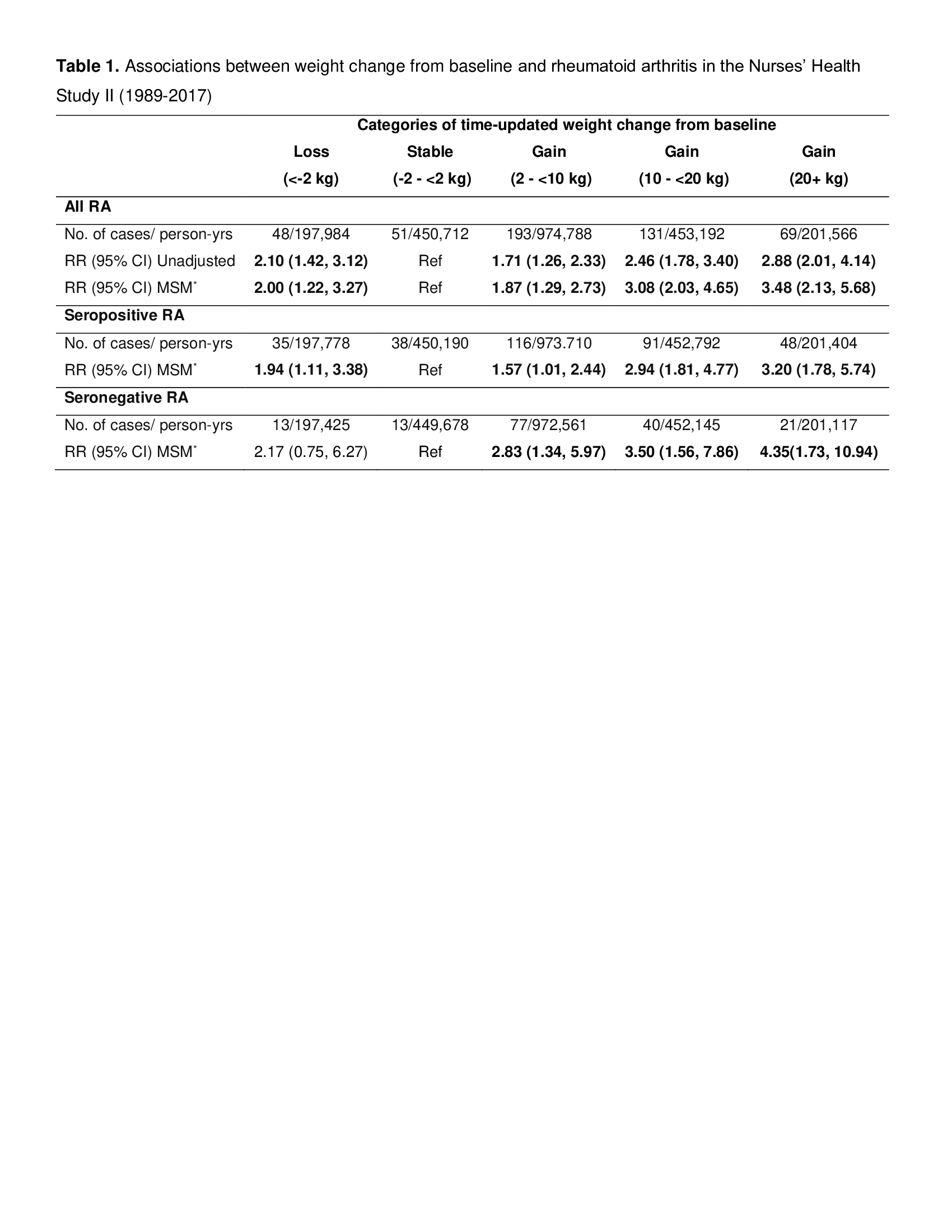Session Information
Date: Sunday, November 8, 2020
Title: Epidemiology & Public Health Poster III: Inflammatory Rheumatic Disease
Session Type: Poster Session C
Session Time: 9:00AM-11:00AM
Background/Purpose: The risk of rheumatoid arthritis (RA) has been shown to be elevated among overweight and obese women in several studies, but whether weight gain or weight loss are associated with RA risk has been studied less. To address time-dependent confounding and allow for a causal interpretation of the data, we used Marginal Structural Models (MSM) to examine the effect of long-term weight changes on the risk of RA in women using data from the Nurses’ Health Study (NHS) II.
Methods: The NHS II prospective cohort study started in 1989 (baseline). We followed up 114,946 women aged from 25 to 42 years and without RA at baseline until 2017 (up to 28 years). We obtained information on lifestyle and health using validated biennial questionnaires. We investigated two time-varying exposures: weight changes from study baseline) and weight changes from age 18. After calculating weight changes every two years, these continuous variables were then divided into 5 categories: 1) weight loss of < -2 kilograms (kg); 2) weight stable -2 to < 2 kg (reference); 3) weight gain of 5 to < 10; 4) weight gain of 10 to < 20; and 5) weight gain of 20+ kg. We used MSMs with inverse-probability-of-censoring and exposure weights that allowed us to create stabilized weights incorporating previous questionnaire cycle weight change, as well as baseline and time-varying covariates. These included baseline weight, age, smoking, parity and breastfeeding status, menopausal status and hormone use, census tract median family income, physical activity, and alcohol intake. Such an approach created a pseudo-population in which the final analyses were performed by pooled logistic regression to approximately calculate risk ratios (RR) and 95% confidence intervals (CI) for the effect of long-term weight gain on the risk of RA in women. Analyses were stratified by serostatus, as risk factors and disease prognosis and severity may differ between these two types of RA.
Results: Over 2,583,266 person-years, we identified 541 women who developed RA. Women who gained 2 kg or more over the study period were at a significantly increased risk of RA. Compared to stable weight, weight gain from baseline of 2 to < 10, 10 to < 20 and 20+ kg was associated with an increased risk of all RA (RR = 1.87, 95% CI 1.29-2.73; 3.08 95% CI 2.03-4.65; 3.48, 95% CI 2.13-5.68, respectively) (Table 1). Weight loss (< -2 kg) was also associated with increased RA risk (RR=2.00, 95% CI 1.22- 3.27) (Table 1). Furthermore, weight gain was significantly associated with an increased risk of both seropositive and seronegative RA. Consistently, weight gain of 10 to < 20 and 20 kg or more from age 18 years was associated with an increased risk of RA (RR = 2.12, 95% CI 1.38-3.27; 2.40, 95% CI 1.55-3.71, respectively) (Table 2).
Conclusion: Long-term weight gain was associated with an increased risk of RA in women. Maintenance of healthy weight may be a potential strategy for the delay or prevention of developing RA.
 *Adjusted for previous questionnaire cycle weight change, baseline weight, age (years, continuous), smoking (never smoker, 12 months breastfeeding), menopausal status and hormone use (pre-menopausal, post-menopausal with never use, current use and past use), census tract median family income (quartiles), physical activity (0–2.9, 3–8.9, 9–17.9, ≥18 METs/week), alcohol intake (0- < 5, 5- < 15, ≥15 grams/day).
*Adjusted for previous questionnaire cycle weight change, baseline weight, age (years, continuous), smoking (never smoker, 12 months breastfeeding), menopausal status and hormone use (pre-menopausal, post-menopausal with never use, current use and past use), census tract median family income (quartiles), physical activity (0–2.9, 3–8.9, 9–17.9, ≥18 METs/week), alcohol intake (0- < 5, 5- < 15, ≥15 grams/day).
 *Adjusted for previous questionnaire cycle weight change, baseline weight, age (years, continuous), smoking (never smoker, 12 months breastfeeding), menopausal status and hormone use (pre-menopausal, post-menopausal with never use, current use and past use), census tract median family income (quartiles), physical activity (0–2.9, 3–8.9, 9–17.9, ≥18 METs/week), alcohol intake (0- < 5, 5- < 15, ≥15 grams/day).
*Adjusted for previous questionnaire cycle weight change, baseline weight, age (years, continuous), smoking (never smoker, 12 months breastfeeding), menopausal status and hormone use (pre-menopausal, post-menopausal with never use, current use and past use), census tract median family income (quartiles), physical activity (0–2.9, 3–8.9, 9–17.9, ≥18 METs/week), alcohol intake (0- < 5, 5- < 15, ≥15 grams/day).
To cite this abstract in AMA style:
Marchand N, Sparks J, Yoshida K, Malspeis S, Zhang X, Costenbader K, Karlson E, Lu B. Long-term Weight Changes and Risk of Rheumatoid Arthritis Among Women in a Prospective Cohort: A Marginal Structural Model Approach [abstract]. Arthritis Rheumatol. 2020; 72 (suppl 10). https://acrabstracts.org/abstract/long-term-weight-changes-and-risk-of-rheumatoid-arthritis-among-women-in-a-prospective-cohort-a-marginal-structural-model-approach/. Accessed .« Back to ACR Convergence 2020
ACR Meeting Abstracts - https://acrabstracts.org/abstract/long-term-weight-changes-and-risk-of-rheumatoid-arthritis-among-women-in-a-prospective-cohort-a-marginal-structural-model-approach/
